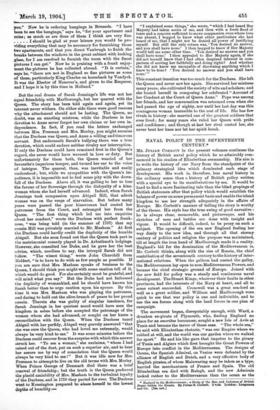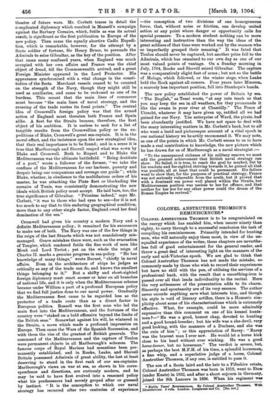MR. JULIAN CORBETT in the present volumes continues the history
of British naval policy which he so admirably com-
menced in his studies of Elizabethan seamanship. His aim is to write the history of our Navy from the standpoint of the primary strategical idea which dominated each stage of development. His work is, therefore, less naval history in the ordinary sense than a history of British policy written with a special eye to its manifestations by sea. It would be hard to find a more fascinating tale than the blind gropings of British statesmen after that policy which would establish the balance of power on some permanent basis and enable the island kingdom to use her strength adequately in the affairs of Europe. Mr. Corbett's manner of telling the story is worthy of the theme. His style has the true awing of good narrative : he is always clear, memorable, and picturesque, and his sketches of men and battles are done with insight and vigour. It would be difficult, indeed, to be prosy on such a subject. The opening of the era saw England feeling her way dimly to the new idea, and through all that stormy century of politics and religion the purpose was maintained, till at length the iron hand of Marlborough made it a reality. England's bid for the domination of the Mediterranean is, Mr. Corbett thinks, along with the rise of Russia, the chief contribution of the seventeenth century to the history of inter- national relations. When the galleon had ousted the galley, the Mediterranean lay open to non-Mediterranean Powers, and became the chief strategic ground of Europe. Joined with the new field for policy was a steady and continuous naval development. The Stuart Kings, whatever their faults in other provinces, had the interests of the Navy at heart, and all to some extent succeeded. Cromwell was a great sea-lord as well as a great soldier, and William and Marlborough were quick to see that war policy is one and indivisible, and to use the sea forces along with the land forces in one plan of campaign.
The movement began, disreputably enough, with Ward, a drunken ex-pirate of Plymouth, who, finding England no place for an emeritus buccaneer, sought a new Isle of Ayes at Tunis and became the terror of those seas. "The whole sea," he said with Elizabethan rhetoric, "was our Empire where we robbed at will, and the world was our garden where we walked for sport." He and his like gave that impetus to the piracy of Tunis and Algiers which first brought the Great Powers of Europe into conflict in the Mediterranean. The designs of Osuna, the Spanish Admiral, on Venice were defeated by the alliance of English and Dutch, and a very effective body of English pirates, of whom Mainwaring may be taken as a type, harried the merchantmen of France and Spain. The old Elizabethan era died with Raiegh, and the new Admirals looked rather to the Mediterranean than the ocean as the
theatre of future wars. Mr. Corbett traces in detail the c3mplicated diplomacy which resulted in Mansell's campaign against the Barbary Corsairs, which, futile as was its actual result, is significant as the first publication to Europe of the new policy. Then came the equally abortive Cadiz Expedi- tion, which is remarkable, however, for the attempt by a Scots soldier of fortune, Sir Henry Bruce, to persuade the Admirals to seize Gibraltar, as the key of the position. After that came many confused years, when England was much occupied with her own affairs and France was the chief object of dread, till the Commonwealth arrived, and a great Foreign Minister appeared in the Lord Protector. His appearance synchronised with a vital change in the consti- tution of the fleets. Merchant vessels ceased to be counted on the strength of the Navy, though they might still be used as auxiliaries, and came to be reckoned as one of its burdens. This meant that the main lines of commerce must become "the main lines of naval strategy, and the crossing of the trade routes its focal points." The central idea of Cromwell's foreign policy was that the armed action of England must threaten both France and Spain alike. A fleet for the Straits became, therefore, the first object of his ambition. It is useless to seek for a list of tangible results from the Cromwelliau policy or the ex- peditions of Blake, Cromwell's great sea-captain. It is in the moral effect, and the insistence upon the new strategical idea, that their real importance is to be found; and in a sense it is true that Marlborough and Shovell reaped what was sown by Blake and Cromwell. Both to Rupert and to Blake the Mediterranean was the ultimate battlefield. "Being destitute of a port," wrote a follower of the former, "we take the confines of the Mediterranean for our harbour, poverty and despair being our companions and revenge our guide "; while Blake, whether, in obedience to the multifarious orders of his master, he was attacking the Plate fleet or blockading the corsairs of Tunis, was consistently demonstrating the new ideals which British policy must accept. He laid bare, too, the true significance of Gibraltar. "Priceless indeed," says Mr. Corbett, "it was to those who had eyes to see—for it is not too much to say that to this enduring geographical condition, more than to any other single factor, England owed her final domination of the sea."
Cromwell had given his country a modern Navy and a definite Mediterranean policy ; it remained for his successors to make use of both. The Navy was one of the few things in the reign of the last Stuarts which was not scandalously mis- managed. Grave mistakes there were, such as the evacuation of Tangier, which rendered futile the fine work of men like Monk and Lord Teviot ; yet on the whole the reign of Charles II. marks a genuine progress in sea-policy. "He has knowledge of many things," wrote Burnet, "chiefly in naval affairs. Even in the architecture of ships he judges as critically as any of the trade can do, and knows the smallest things belonging to it." But a shifty and short-sighted foreign diplomacy must react sooner or later on all branches of national life, and it is only when the Mediterranean scheme became under William a part of a profound European policy that we find full justice done to our naval power. Gradually the Mediterranean fleet came to be regarded less as the protector of a trade route than as a direct factor in European politics. Russell was the first man who led the main fleet into the Mediterranean, and the fortunes of the country were "staked on a bold offensive beyond the limits of the British seas." Somewhat against his will, he wintered in the Straits, a move which made a profound impression on Europe. Then came the Wars of the Spanish Succession, and with them the rise of the greatest of British generals. The command of the Mediterranean and the capture of Toulon were permanent objects in all Marlborough's schemes. The famous corps of Royal Marines had meantime been per- manently established, and in Rooke, Leake, and Shovell Britain possessed Admirals of great ability, the last at least deserving to stand in the first rank of our sea-captains. Marlborough's views on war at sea, as shown in his corre- spondence and directions, are curiously modern, and he may be said to have first evolved into a reasoned policy what his predecessors had merely groped after or guessed by instinct. "It is the conception to which our naval strategy has recurred after two centuries of experience
—the conception of two divisions of one homogeneous. force, that, without noise or friction, can develop united
action at any point where danger or opportunity calls for special pressure. To a modern student nothing can be more interesting and instructive than the way the ideas of the great soldiers of that time were worked out by the seamen who. so imperfectly grasped their meaning." It was fated that
Toulon should never be captured, but another prize fell to the Admirals, which has remained to our own day as one of our most valued points of vantage. On a Sunday morning in
July, 1704, Rooke and Shovell seized Gibraltar. The capture was a comparatively slight feat of arms ; but not so the battle of Malaga, which followed, or the winter siege, when Leake held the Rock against all comers. Four years later Minorca,. a scarcely less important position, fell into Stanhope's hands.
The new policy established the power of Britain by sea. "The English," as Tease wrote, "at any rate teach us that
you may keep the sea in all weathers, for they promenade it like the swans in your river at Chantilly." The Peace of Utrecht, whatever it may have given up, ratified all we had gained for our Navy. The enterprise of Ward, the pirate, had been abundantly justified. We have not space to deal with the many interesting matters in Mr. Corbett's book, but to all who want a lucid and picturesque account of a vital epoch in our national history we he artily recommend it. We may note,
as one of the points in which Mr. Corbett seems to us to have made a real contribution to knowledge, the new picture which be has drawn for us of Marlborough as a naval strategist :—
"To the unsurpassed richness of his military renown we must add the greatest achievement that British naval strategy can show. He failed, it is true, to reach the goal he marked, but by his resolute and far-sighted striving towards it, he gained all that, was possible, all at least that could be permanent. His failure went to show that, for the purposes of practical strategy, France was not seriously vulnerable from the south, but it proved that with a dominant sea power well placed within the Straits, her Mediterranean position was useless to her for offence, and that neither for her nor for any other power could the dream of the Roman Empire be revived."











































 Previous page
Previous page